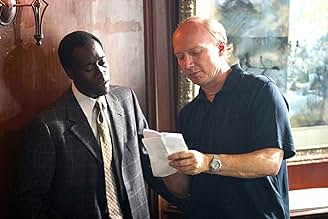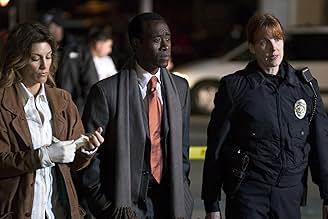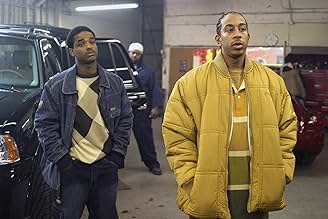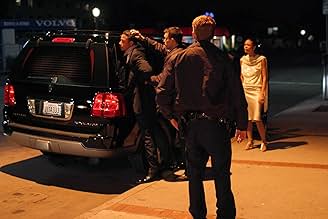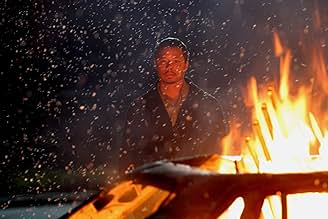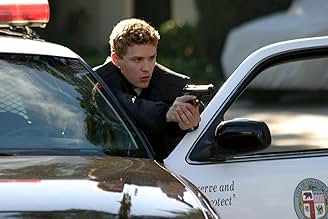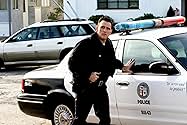Las vidas de varios ciudadanos de Los Ángeles colisionan en una serie de historias entrelazadas de identidad, perdida y redención.Las vidas de varios ciudadanos de Los Ángeles colisionan en una serie de historias entrelazadas de identidad, perdida y redención.Las vidas de varios ciudadanos de Los Ángeles colisionan en una serie de historias entrelazadas de identidad, perdida y redención.
- Dirección
- Guionistas
- Elenco
- Ganó 3 premios Óscar
- 66 premios ganados y 112 nominaciones en total
Thandiwe Newton
- Christine
- (as Thandie Newton)
Eddie J. Fernandez
- Officer Gomez
- (as Eddie Fernandez)
Opiniones destacadas
Take the pop-cultured infused socio-political discourse of a Spike Lee movie, the glossy grit of a Michael Mann LA crime story, and the compelling mosaic story-telling technique of a Paul Thomas Anderson film, and you'll get the "feel" for Paul Haggis' stunning directorial debut. To boil a film like "Crash" down to such terms, however, would do it severe injustice. Powerful and thought provoking, this is the most accomplished and compelling film since "21 Grams" premiered back at the end of 2003.
"Crash" brilliantly shows through intertwining vignettes, that are often blazingly funny in their brutal honesty and fascinatingly gut-wrenching in their melodrama, how subtle racism (often guised in nervous humor) and overt prejudice (often exasperated by sudden irrational violence and an overabundance of readily available firearms) completely permeate our culture and everyday interactions within society. A hyper intelligent script showcases not characters, but brilliant representations of real people, people we know and pass in the street every day, people not unlike us. People who at first seem to be lost causes in the war against racism (witnessed in Matt Dillon's harried beat cop and Sandra Bulluck's spoiled District Attorney's wife) can often become the most unlikely solutions to the problem, while people who ride in on their high horse (witnessed in Ryan Phillipe's noble young police officer) can turn against the tide in the blink of an eye. No one is immune to it no matter how hard they try to rise above it (witnessed in Don Cheadle's quietly tragic detective).
In the end, everyone is flawed, the racism is inescapable, and the audience feels a twinge of sympathy for just about everyone. Perhaps that is what Haggis is hinting at to be our answer. Showing empathy and being able to relate even on the most remote level to every human being out there is the first step to that true brotherhood of man. Because the film offers no real solution, the discussion and discourse it creates in the minds of the viewers is the first step in solving society's ills. We can't tackle everything at once, but we can open a dialogue, and hopefully, one person conversing with another will be the first step to our salvation. It takes a bold film to raise such questions, and an even greater one to compel an audience to talk about the potential answers, and that is exactly what "Crash" accomplishes.
"Crash" brilliantly shows through intertwining vignettes, that are often blazingly funny in their brutal honesty and fascinatingly gut-wrenching in their melodrama, how subtle racism (often guised in nervous humor) and overt prejudice (often exasperated by sudden irrational violence and an overabundance of readily available firearms) completely permeate our culture and everyday interactions within society. A hyper intelligent script showcases not characters, but brilliant representations of real people, people we know and pass in the street every day, people not unlike us. People who at first seem to be lost causes in the war against racism (witnessed in Matt Dillon's harried beat cop and Sandra Bulluck's spoiled District Attorney's wife) can often become the most unlikely solutions to the problem, while people who ride in on their high horse (witnessed in Ryan Phillipe's noble young police officer) can turn against the tide in the blink of an eye. No one is immune to it no matter how hard they try to rise above it (witnessed in Don Cheadle's quietly tragic detective).
In the end, everyone is flawed, the racism is inescapable, and the audience feels a twinge of sympathy for just about everyone. Perhaps that is what Haggis is hinting at to be our answer. Showing empathy and being able to relate even on the most remote level to every human being out there is the first step to that true brotherhood of man. Because the film offers no real solution, the discussion and discourse it creates in the minds of the viewers is the first step in solving society's ills. We can't tackle everything at once, but we can open a dialogue, and hopefully, one person conversing with another will be the first step to our salvation. It takes a bold film to raise such questions, and an even greater one to compel an audience to talk about the potential answers, and that is exactly what "Crash" accomplishes.
I do not want to do an in-depth analysis of this film. Rather, I'll point out what I consider makes it a very poor effort: the script. The same guy who did the script for CRASH also did the script for MILLION DOLLAR BABY. Both won the Oscar for best picture. I must be pretty out of touch to criticize this guy, but here goes. The main problem is that every character is "invented". That is, each character is so obviously the product of a fertile (and I am using that word kindly) imagination. In CRASH the politician and his wife are absolute stereotypes. They speak the most inane lines, like from a comic book or low-grade soap opera. The two cops are similarly contrived. One is a good guy and one is a bad guy. One is an idealist. One is a cynical veteran. I imagine such categories of cops do exist, but to give them life it takes someone who knows the genres, like Joseph Wambaugh. (In fact, to see how really bad CRASH is, just compare it to THE ONION FIELD). We also have the two foul-mouthed gang-banging black youth, hell bent on insanity. Big deal. Anyone can produce such characters. There is the misunderstood, good-guy Mexican plumber, who just happens to love his young daughter oh so much. Etc. Etc. Each character has the depth of a comic-book creation. They all speak in litanies of clichés. The plot too is just a clever manage of intersections. It is so obviously the product of the next cup of coffee or cigarette. It is cleverness without depth or substance. Christ, that this film won best picture just begs belief.
While I am getting in my two cents here, MILLION DOLLAR BABY is the same cliché-riddled mess. It is obvious that the guy who wrote knew nothing about boxing. The characters are pathetic, lifeless creations.
What has Hollywood come to that such movies walk away with top prize?
While I am getting in my two cents here, MILLION DOLLAR BABY is the same cliché-riddled mess. It is obvious that the guy who wrote knew nothing about boxing. The characters are pathetic, lifeless creations.
What has Hollywood come to that such movies walk away with top prize?
Lives, ordinary lives, vital part of a city where, I'm sure, the devil has him home. Contradictory, awful, enlightened, confused. There are so many good moments in "Crash" that I felt the need to see it again less than 24 hours later. Matt Dillon lead us through his own contradiction with the humanity of someone who knows he carries something rotten inside. The explosive dissatisfaction that permeates Sandra Bullock's life is ferociously real and the frustration of Thandie Newton's character is a first on the screen. We've never seen it quite like that and her performance will stay with me. Larenz Tate personifies both sides of the equation, the one who understands but goes against his instincts, and still there are chilling flashes of innocence in his eyes -- his performance reminded me of the wonderful "Seeds Of Tragedy" were his innocence was intact. The problem with "Crash" and it is problem is that remains a rather shallow affair. Cleverly put together but epidermic at best.
10Brambo
In a drama strikingly reminiscent in style and tone of P.T. Anderson's film Magnolia (1999), the narrative in Crash shifts between 5 or 6 different groups of seemingly unconnected characters, whose relationships to each other are only revealed in the end.
Not to be confused with the David Cronenberg feature of the same name, this Crash is the feature-length, studio-released directorial debut of veteran Canadian TV writer/producer/director and two-time Emmy-winner Paul Haggis. An in-depth exploration on the themes of racism and prejudice, cause and effect, chance and coincidence, and tragedy, "crash" is a metaphor for the collisions between strangers in the course of day-to-day existence. Set over a 24-hour period in contemporary L.A., it is a social commentary on the interconnectedness of life in the big city.
Crash features a top-notch ensemble cast which includes: Sandra Bullock, Don Cheadle, Matt Dillon, Jennifer Esposito, Brendan Fraser, Chris "Ludacris" Bridges, Loretta Devine, Thandie Newton, Ryan Phillipe and Larenz Tate. All put in superb performances in a tight script which is at once gritty, heartwarming, shocking, tragic and witty, and which will ring true with viewers of all demographics.
Centering around two disturbing car accidents, a carjacking, vicious workplace vandalism, and the suspicious shooting death of one police officer by another, the drama is set against the backdrop of a racist LAPD and Los Angeles justice system. Action shifts between the various characters, whose lives collide with each other in unpredictable ways as each faces their own moral dilemma, and tries to cope with the consequences of their resulting decision made or action taken. Each of the dozen or so main characters undergoes some type of a personal metamorphosis as the various story lines head toward a striking, common conclusion, which succeeds at being both cathartic and unsettling.
Crash is backed by a solid and varied, original soundtrack and excellent cinematography. Sweeping, wider shots alternate with disjointed camera angles which convey the chaos and confusion of the characters and the unpredictability of life. Occasional lingering close-ups -- on occasion without sound -- capture the actors' facial expressions, which suitably detail key moments of the characters' aching pain, fear, anger, bitter anguish, remorse or grief, far better than any dialogue could.
This breathtaking film is destined to be a critical smash and box-office hit. Five stars.
Not to be confused with the David Cronenberg feature of the same name, this Crash is the feature-length, studio-released directorial debut of veteran Canadian TV writer/producer/director and two-time Emmy-winner Paul Haggis. An in-depth exploration on the themes of racism and prejudice, cause and effect, chance and coincidence, and tragedy, "crash" is a metaphor for the collisions between strangers in the course of day-to-day existence. Set over a 24-hour period in contemporary L.A., it is a social commentary on the interconnectedness of life in the big city.
Crash features a top-notch ensemble cast which includes: Sandra Bullock, Don Cheadle, Matt Dillon, Jennifer Esposito, Brendan Fraser, Chris "Ludacris" Bridges, Loretta Devine, Thandie Newton, Ryan Phillipe and Larenz Tate. All put in superb performances in a tight script which is at once gritty, heartwarming, shocking, tragic and witty, and which will ring true with viewers of all demographics.
Centering around two disturbing car accidents, a carjacking, vicious workplace vandalism, and the suspicious shooting death of one police officer by another, the drama is set against the backdrop of a racist LAPD and Los Angeles justice system. Action shifts between the various characters, whose lives collide with each other in unpredictable ways as each faces their own moral dilemma, and tries to cope with the consequences of their resulting decision made or action taken. Each of the dozen or so main characters undergoes some type of a personal metamorphosis as the various story lines head toward a striking, common conclusion, which succeeds at being both cathartic and unsettling.
Crash is backed by a solid and varied, original soundtrack and excellent cinematography. Sweeping, wider shots alternate with disjointed camera angles which convey the chaos and confusion of the characters and the unpredictability of life. Occasional lingering close-ups -- on occasion without sound -- capture the actors' facial expressions, which suitably detail key moments of the characters' aching pain, fear, anger, bitter anguish, remorse or grief, far better than any dialogue could.
This breathtaking film is destined to be a critical smash and box-office hit. Five stars.
After seeing this movie, I was able to really understand what "Six Degrees of Separation" means. There is a thread that weaves its way through the landscape of life connecting, influencing, and defining all. This movie is certainly thought-provoking, one cannot watch it without feeling either privileged to have become part of the fabric, or like a fly on the wall - seeing, yet unable to influence or guide. There is almost a sense of frustration at ones inability to be no more than an observer in this movie since it compels you to want to shout in warning, gasp in shock, cry in sorrow, and hold in comfort. "Crash" is definitely not a movie to use as a venue to escape life for a couple of hours, but it is a movie that certainly makes you take a second and third look at who you are within yourself. The actors are surprising not only for their depth of performance, but also because they do not play characters you think you know. I would highly recommend this movie to anyone who likes drama, action, comedic relief, or just an appreciation for a well-thought out movie.
Oscars Best Picture Winners, Ranked
Oscars Best Picture Winners, Ranked
See the complete list of Oscars Best Picture winners, ranked by IMDb ratings.
¿Sabías que…?
- TriviaPaul Haggis holds the distinction of being the only person ever to write the screenplay for two consecutive Best Picture winners. He also wrote the previous year's Best Picture winner, Golpes del destino (2004).
- ErroresPartway through Officer Ryan's rescue of Christine from her overturned SUV, the camera ran out of film, as evidenced by film sprocket holes appearing in the frame. This is an acknowledged goof from director Paul Haggis.
- Citas
[first lines]
Graham: It's the sense of touch. In any real city, you walk, you know? You brush past people, people bump into you. In L.A., nobody touches you. We're always behind this metal and glass. I think we miss that touch so much, that we crash into each other, just so we can feel something.
- Créditos curiososProducers gratefully acknowledge the valuable assistance of The Culbert Family; Members of the Actors Gym, Hollywood, California.
- Versiones alternativasThe two-disc director's cut DVD features an additional two minutes of dialogue and footage
- ConexionesFeatured in 'Crash' Featurette (2005)
- Bandas sonorasCity of Angel
Written by Sungsoo Kim
Published by Nirvana Music
Performed by Sungsoo Kim
Courtesy of Cats Records
Selecciones populares
Inicia sesión para calificar y agrega a la lista de videos para obtener recomendaciones personalizadas
Detalles
- Fecha de lanzamiento
- Países de origen
- Sitio oficial
- Idiomas
- También se conoce como
- Crash
- Locaciones de filmación
- 3500 S. Gaffey Street, San Pedro, Los Ángeles, California, Estados Unidos(overturned car accident)
- Productoras
- Ver más créditos de la compañía en IMDbPro
Taquilla
- Presupuesto
- USD 6,500,000 (estimado)
- Total en EE. UU. y Canadá
- USD 54,580,300
- Fin de semana de estreno en EE. UU. y Canadá
- USD 9,107,071
- 8 may 2005
- Total a nivel mundial
- USD 98,410,061
- Tiempo de ejecución
- 1h 52min(112 min)
- Color
- Mezcla de sonido
- Relación de aspecto
- 2.35 : 1
Contribuir a esta página
Sugiere una edición o agrega el contenido que falta


